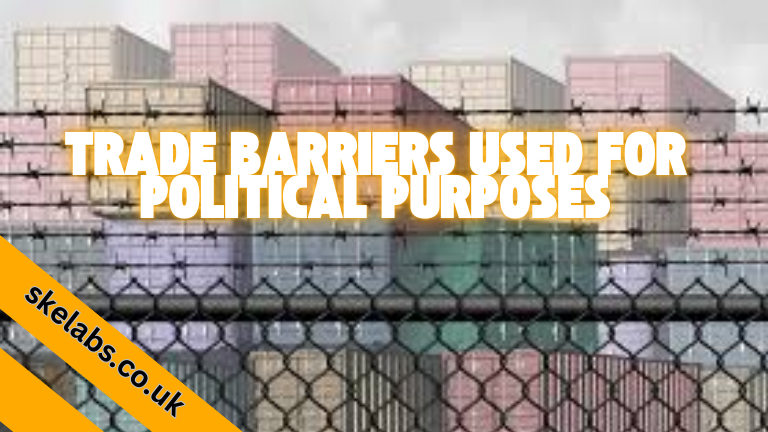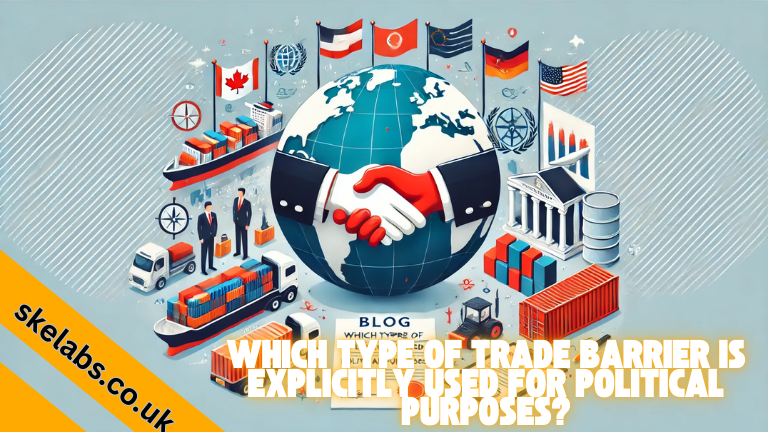Exchange boundaries are devices utilized by nations to control global exchange and safeguard their homegrown business sectors. They frequently intend to adjust import/export imbalances, safeguard homegrown enterprises, or accomplish key monetary objectives. Be that as it may, some exchange boundaries are expressly utilized for political purposes, impacting worldwide relations or applying tension on different countries. This article investigates the different sorts of exchange hindrances and dives into those explicitly intended for political purposes.
QUICK ANSWER
Embargoes and sanctions are the trade barriers explicitly used for political purposes. They aim to isolate nations, pressure policy changes, or punish unethical practices like human rights violations or military aggression.
Types of Trade Barriers
Exchange boundaries can commonly be classified into the accompanying kinds:
Levies: Taxes will be charges or obligations forced on imported products. While they are regularly used to safeguard homegrown businesses and produce government income, they can likewise be utilized politically to fight back against or pressure another country.
Shares: Portions limit the amount of products that can be imported or traded. Strategically, shares can be utilized to control the accessibility of explicit items in the worldwide market, affecting countries dependent on those merchandise.
Endowments: Legislatures give sponsorships to neighborhood enterprises to make them more aggressive. However not an immediate boundary, sponsorships can set off exchange questions when seen as unjustifiable by exchanging accomplices.
Bans: Bans include the restriction of exchange with a particular country. These are unequivocally utilized for political purposes, frequently as a device to propel a country to change its strategies or conduct. For example, exchange bans were broadly applied during the Virus Battle to segregate ill-disposed countries.
Sanctions: Authorizations are limitations forced on a nation’s exchange, finance, or other financial exercises. They are frequently used to rebuff or hinder bothersome activities, like basic liberties infringement, military hostility, or atomic expansion.
Non-Levy Boundaries (NTBs): Non-tax hindrances incorporate guidelines, principles, and permitting necessities that confine exchange. While they might seem specialized, NTBs can be politically propelled, focusing on unambiguous nations or items.
Intentional Commodity Restrictions (VERs): VERs are arrangements among trading and bringing in nations to restrict sends out. In spite of the fact that they are willful in name, they frequently result from political dealings or tension.
Also Check: What is Felonious Assault? A Comprehensive Guide
Trade Barriers Used for Political Purposes

While all trade barriers can have political implications, embargoes and sanctions are the most explicitly used for political purposes. Let’s explore these in detail:
Embargoes
Embargoes are one of the most direct and visible trade barriers used for political objectives. Governments impose embargoes to:
- Isolate a Nation: By cutting off trade, embargoes isolate the targeted country economically and politically.
- Pressure for Policy Change: Embargoes are used to force nations to alter their policies. For example, the United States imposed a trade embargo on Cuba for decades, aiming to pressure the Cuban government to embrace democratic reforms.
- Punish Aggression: During conflicts or acts of aggression, embargoes serve as a punitive measure. The UN has imposed trade embargoes on countries like North Korea for its nuclear weapons program.
Sanctions
Sanctions are a broader category that includes restrictions on trade, financial transactions, and even access to international markets. Sanctions are designed to:
- Deter Unethical Practices: Nations may impose sanctions to address human rights violations or political oppression. For instance, sanctions have been imposed on Myanmar for its treatment of ethnic minorities.
- Limit Military Expansion: Sanctions on arms trade or dual-use technologies aim to prevent nations from enhancing their military capabilities.
- Send a Diplomatic Message: Sanctions signal international disapproval and serve as a warning to other nations.
Examples of Politically Motivated Trade Barriers
- United States vs. China (Tariffs): The U.S.-China trade war is a recent example of tariffs used for political purposes. The United States imposed tariffs on Chinese goods to address trade imbalances and intellectual property theft, but it also aimed to curb China’s growing economic influence.
- Russia Sanctions: After Russia’s annexation of Crimea in 2014, many countries imposed sanctions on Russia, targeting its energy sector and key industries. These sanctions were meant to pressure Russia to withdraw and respect Ukraine’s sovereignty.
- Arab Oil Embargo (1973): The Arab nations imposed an oil embargo on countries supporting Israel during the Yom Kippur War. This embargo was explicitly political, aiming to influence the foreign policies of Western nations.
Impacts of Political Trade Barriers

Political trade barriers often have far-reaching consequences:
- Economic Repercussions: Targeted nations face economic hardship due to restricted access to markets, goods, and financial systems.
- Global Supply Chain Disruptions: Embargoes and sanctions can disrupt the flow of essential goods, affecting global trade.
- Political Tensions: Politically motivated barriers can escalate tensions between countries, leading to long-term diplomatic challenges.
- Domestic Impacts: Domestic industries in the imposing country may face higher costs or shortages of imported goods.
Also Check: What Is Golding Referring with Mankind’s Essential Illness?
FAQs
What is a trade barrier that is explicitly used for political purposes?
A trade embargo is a common type of trade barrier used explicitly for political purposes. It restricts trade with a specific country or entity to achieve political or diplomatic objectives.
How do trade embargoes serve political purposes?
Trade embargoes are used to pressure governments or organizations to change policies, comply with international law, or address human rights concerns by cutting off economic benefits.
Can trade barriers used for political purposes impact global trade?
Yes, such trade barriers can disrupt global supply chains, impact businesses in multiple countries, and escalate tensions between nations, potentially leading to broader economic consequences.
Conclusion
Trade barriers serve various purposes, but when explicitly used for political objectives, they become powerful tools of diplomacy and coercion. Embargoes and sanctions stand out as the most direct methods of applying political pressure, influencing international relations, and addressing global issues. While effective in achieving short-term goals, politically motivated trade barriers can lead to unintended consequences, making their use a complex and often controversial decision. Understanding these dynamics is crucial for policymakers, students, and anyone interested in global trade and international relations.

